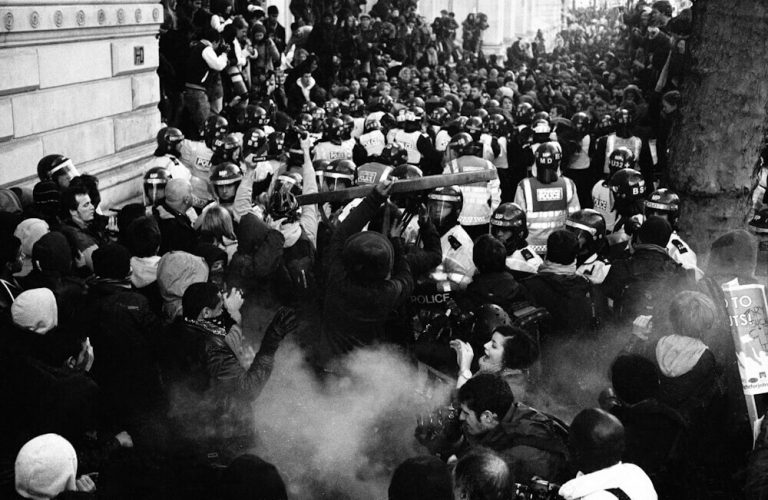Non lethal weapons allow police to injure and kill protestors with tear gas, batons and rubber bullets
The protests sparked by the killing of George Floyd in the hands of white Minneapolis officer Derek Chauvin are carrying on in the US and around the world, demanding an end to police brutality and systemic racism. In response, and somewhat unsurprisingly, police violence has been the main reaction to the demonstrations, with continuing attacks towards protestors perpetrated with the use of so-called ‘non-lethal’ weapons, which are also known as ‘less-lethal’ weapons for a more accurate definition.
Despite their deceitful name, non-lethal weapons can do severe damages and lead to death, which is why their abuse should not be underrated. Pepper spray, tear gas, tasers, sound cannons, rubber and wooden bullets, and batons are just some of the many weapons the police in the US are using to disperse and suppress protesters, injuring thousands of people, and in some cases killing them too.
While not all non-lethal weapons are equally dangerous, according to the 2015 annual report written by the Inter-American Commission on Human Rights (IACHR) for the United Nations General Assembly, “Almost any use of force against the human person can under certain circumstances lead to loss of life or serious injury.”
In 1990, in an attempt to reduce the use of firearms by the police, the United Nations adopted the Basic Principles on the Use of Force and Firearms by Law Enforcement Officials, but despite its forward-looking intention, the promotion of non-lethal weapons ended up enabling the use of excessive force by police, which we are yet again witnessing during these new anti-police and anti-racism protests.
Tear gas can be lethal, especially if you suffer from respiratory conditions
Take tear gas for instance, which is the chemical weapon that was utilised to disperse protesters minutes before President Trump gave his infamous speech holding an upside-down bible on Lafayette Square in Washington, DC, and whose use was actually banned from warfare under the Geneva Convention. Although it remains classified as a non-lethal weapon, tear gas can lead to death, as we saw in the case of Sarah Grossman, a 22-year-old woman who died last week after her asthma was triggered by the tear gas sprayed during the protest she was attending in Ohio. Tear gas can strongly endanger someone with respiratory problems, which makes it even more dangerous in the midst of the COVID-19 pandemic.
The baton and Long Range Acoustic Devices
Among other popular non-lethal weapons currently being used during the protests is the baton, which falls under the category of ‘kinetic impact weapons’ (alongside non-lethal guns which use projectiles such as rubber and wooden bullets), which differ from those defined as ‘physiological weapons’ such as sound cannons. Also called Long Range Acoustic Devices (LRADs), sound cannons are extremely loud speakers initially developed to send messages and warning tones over longer distances or at a higher volume than normal loudspeakers.
Used by the police against protesters, their sound is so loud and unbearable it is used to disperse crowds. But as reported by Amnesty International in The human rights impact of less lethal weapons and other law enforcement equipment, sound cannons can inflict long-term (and, in some cases, permanent) damage to someone’s hearing. Less common than other non-lethal weapons, LRADs have recently been used by police in Miami and Denver, as well as in 2014 during the protests following Eric Garner’s death by New York City police officer Daniel Pantaleo.
As the conversation surrounding the US police is set to shed light on its systemic violent structure, the abuse of non-lethal weapons should not go unnoticed either. When the police are allowed to use force in the name of state security, armed with both lethal and non-lethal weapons, the basis of that same institutional body should not only be questioned but reconfigured once and for all.
Having to confront strategic violent attacks when protesting for an end to police brutality is the tragic paradox that validates—not that there was any need for extra validation—the requests made by the Black Lives Matter movement. The array of weapons that are handed to the US police speaks of the intrinsic coercive attitude of this state body, and as necessary as it is for the police and its use of weapons (lethal or non-lethal) to be regulated, it is its whole structural violent attitude that needs to change.
Because, as we’ve unfortunately witnessed, it can take only a knee to end a life. Imagine what you can do with an endless supply of so-called ‘non-lethal’ weapons.





